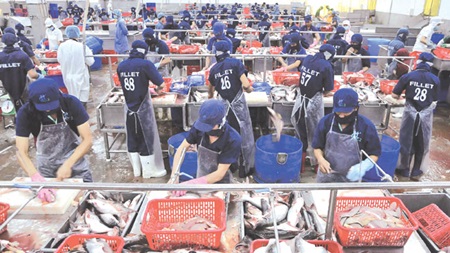There will be no significant change in the Vietnamese economy next year even though a number of free trade agreements and the Trans-Pacific Partnership will take effect, the head of a government think tank has said.

Speaking at the Viet Nam Economic Outlook 2016 conference in HCM City on Wednesday, Nguyen Dinh Cung, president of the Ministry of Planning and Investment's Central Institute for Economic Management, said, "I must warn [everyone] to avoid expectations about a dramatic change in the Vietnamese economy merely because of deeper international integration."
While agreeing the economy has recovered, he pointed out that the recovery depends mostly on the mineral extraction industry.
Another major sector that has recovered is agriculture, forestry and seafood, but it faces challenges in both the short and long terms, he said.
"The industry's household-production model is no longer appropriate. We need a new model of production with huge lands so that it can be mechanised, but there is no policy to create this model right now."
He pointed to another sign of weakness in the country's economy: "Our economy has just recovered but a trade deficit has occurred immediately. It means our production is deeply dependent on imports.
"The economic structure and growth style are still the same and there is no change at all."
Pointing to the unusual fact that despite very low inflation bank interest rates have changed little, he said, "It reveals that there are many problems in our economy — like bad loans, foreign exchange rate volatility, and low capital efficiency of enterprises."
One achievement of the Vietnamese economy is to maintain low inflation, but there are many factors threatening that, including fluctuating bank interest rates and foreign exchange rate.
Private and foreign investments are increasing, accounting for 35 per cent of gross capital formation, but they are unable to achieve their full potential because they are being crowded out by public spending, he said.
Talking about the budget, he said the deficits and greater outlay for expenses rather than investment are "harmful both to economic stability and growth".
In 2016 the international economy would recover but not at a uniform rate everywhere, he said.
There would be drastic changes in the Chinese economy but its effect on the Vietnamese economy would be unpredictable, he said.
"The Vietnamese economy will slowly recover but there won't be any change in the growth model or sustainability. The economy will steady temporarily but still be affected by outside factors.
"Foreign investment will continue to flow into Viet Nam thanks to free trade agreements, and to take advantage of this, Viet Nam must accelerate reform of the business environment."
The head of the Japan External Trade Organisation (JETRO) in HCM City, Hirotaka Yasuzumi, said in 2013 -15 Viet Nam has attracted investments from over 500 Japanese companies each year.
"Japanese enterprises have adopted a strategy of Thailand + 1 and China + 1 to cope with the increasing human resource cost in these two nations and the risks of natural disasters in Thailand and diplomatic difficulties in China.
"ASEAN is a good choice for the strategy and has attracted half of Japanese enterprises moving out of Thailand and China. Viet Nam has attracted a half of the Japanese enterprises that have moved to ASEAN."
He said there are five risks in doing businesses in Viet Nam – lack of transparent legal system; high cost of human resources; cumbersome administrative and tax procedures; and authorities' inconsistency in interpreting laws.
Though things improved in 2014 according to 7.3 – 15.4 per cent of respondents, it is not enough to attract companies that prefer a transparent and healthy business environment, he said.
"Viet Nam has a lot of work to do to take advantage of free trade agreements."
The conference was organised by the HCM City CEO Club.
VNS